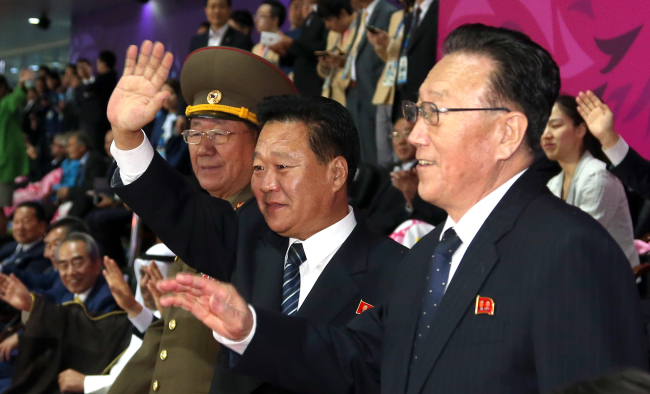The 17th Asian Games Incheon 2014 that ended on Saturday surprised the world ― not just for its spectacular K-pop performances or medals dominated by China, but because of an unprecedented visit by top officials from North Korea.
The North Korean delegation consisted of the three confidants to North Korea’s supreme leader Kim Jong-un. They are known as the secretive state’s political and military heavyweights who buttress the leadership of the young ruler, who took over the reclusive regime in December 2011.
Leading the delegation was Hwang Pyong-so, widely believed to be North Korea’s second in command. Hwang rose to power early this year after being tapped to head the North Korean Army’s General Political Bureau, which supervises the regime’s 1.2 million military members. In April, he was promoted to vice marshal, a rank higher than four-star general. He was also appointed last week as vice chairman of the North’s National Defense Commission, cementing his status as a top military commander.
 |
Hwang Pyong-so (from left), head of the North Korean Army’s General Political Bureau; Choe Ryong-hae, secretary of the Worker’s Party; and Kim Yang-gon, veteran official in charge of South Korean affairs, wave to their compatriot participants during the closing ceremony of the 2014 Incheon Asian Games on Saturday. (Yonhap) |
Hwang was accompanied by two other top-ranking officials: Choe Ryong-hae, another key aide to Kim Jong-un, and Kim Yang-gon, a longtime senior official responsible for South Korean affairs.
Choe, head of the regime’s agency promoting sports, was previously Pyongyang’s No. 2 man. But he recently lost his military influence to Hwang. Nonetheless, Choe still appears to hold considerable political power, according to observers.
He currently serves as secretary of the ruling Workers’ Party, in charge of the labor group. The post is lower than the one in the military. But Choe’s position is still influential because the labor group is a critical pillar of the communist state, they added.
Kim Yang-gon is a longtime veteran official responsible for South Korean affairs since 2007. He was an envoy of former North Korean leader Kim Jong-il and was dispatched to South Korea in 2007 and 2009.
The visit by the three high-level officials thrilled the South Korean government, as well as media in and out of the country. Their 12-hour visit to South Korean soil was ostensibly for the closing ceremony held on Saturday evening, but it clearly signified Pyongyang’s will to reengage in reconciliatory talks with Seoul.
Some observers believe that they may have carried a “special” message from their leader to South Korean President Park Geun-hye.
South Korea’s Unification Minister Ryoo said Hwang asked him to deliver a “heartfelt greeting” to Park. The contents of the message were not revealed. However, critics highlight the presence of Hwang as the North’s high-ranking military commander seems to have no clear reason to attend the closing ceremony of an international sporting event if not for a political motive.
Hwang and his delegation did not meet President Park. The Unification Ministry said Park wanted a meeting, but their tight schedule did not allow for a visit to the presidential office.
By Cho Chung-un (
christory@heraldcorp.com)








